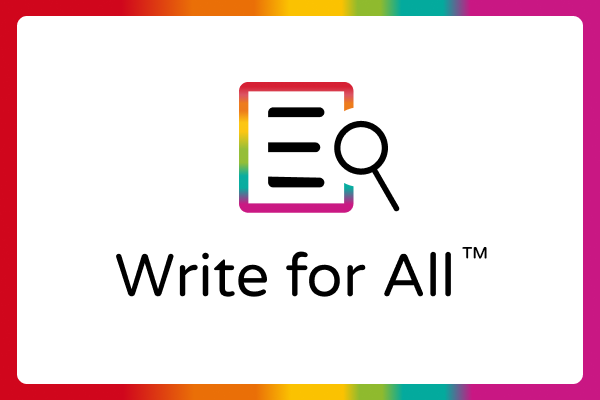We want to improve the language used in websites to be more inclusive (of all communities) while also educating the public about exclusionary language.
Our goal is to help make content on the web more inclusive towards all genders, LGBTQ+ people, and more.
Preview of our web search tool
Wanna help out?
Check out our Contributors Wanted page and contact us on slack.
Contents:
- Project
- Frequently asked questions (FAQ) on gender
- Resources
- Gender-inclusive language list
- Pronoun grammar
- LGBTQ Inclusive Language Resources
- On Avoiding Ablist Language
We are creating a web tool that searches websites for gender/LGBTQ-exclusive or problematic words and suggests more inclusive words. For example, you can search for the gender-exclusive word "fireman", and the tool will find it, and suggest the gender-inclusive word "firefighter".
We welcome help and constructive criticism. Here are some ways to parcipated.
-
Join the team at Hack For LA.
We meet on Tuesday evenings downtownDue to covid-19, we meet Wednesdays at 7pm PT on Zoom, and we keep in touch during the week via remote tools like Slack and Zoom. -
Share your opinion about what words you want to search. We are currently experimenting with words on this list, and we anticipate that many people may want to create their own lists of words.
Here are gender inclusive language words I’ve used with other projects:
https://github.com/joelparkerhenderson/gender_inclusive_language
Here’s a way to search one site for a bunch of words:
https://raw.githack.com/joelparkerhenderson/site_searcher/master/index.html
Email Joel Parker Henderson (joel@joelparkerhenderson.com).
If you are a Hack For LA member, then our Slack channel is #writeforall
For now, the project licensing is GPL-2.0-only
If you have licensing needs, please contact us and let us know what you prefer.
This section is thanks to United Nations Population Fund
The term gender refers to the economic, social and cultural attributes and opportunities associated with being male, female, transgender, etc. Many societies have different expectations about how people of different genders should dress, behave, work, love, marry, raise families, and participate in the society and its culture. Re
Gender differs from sex in that gender is social and cultural in nature, and sex is biological. Gender attributes and characteristics, encompassing, inter alia, the roles that people of different genders play, and the expectations placed upon the people, vary widely among societies and change over time. But the fact that gender attributes are socially constructed means that they are also amenable to change in ways that can make a society more just and equitable.
Gender equity is the process of being fair to all people, regardless of gender, such as male, female, transgender, agender, etc. Gender equity is linked to sustainable development and is vital to the realization of human rights for all. The overall objective of gender equity is a society in which all people enjoy the same opportunities, rights, and obligations, in all spheres of life, regardless of gender.
Gender-neutral language - Wikipedia
Gender equality - United Nations
Frequently asked questions about gender equality - United Nations
Gender-inclusive language - United Nations
Understanding Gender - Gender Spectrum
What Does It Mean to Be Non-Binary or Enby? - Verywell Mind
Gender Equity Vs. Gender Equality: What’s the Distinction? - Pipline Equity)
Why We Need Gender Equity Now - Forbes
How to Use Gender-Neutral Words - Teen Vogue
Gender-Inclusive Guidelines - Pitt.edu
Gender Neutral Pronouns & Inclusive Language - Harvard.edu
Gender-neutral language - European Parliament
This list is organic, adaptable to local context, social context, priorities, cultural sensitivities, etc.
We welcome constructive feedback.
We welcome contributions in other languages.
| Gendered pronoun | Gender-inclusive pronoun |
| he, she | they |
| him, her | them |
| his, hers | theirs |
| Gendered noun | Gender-inclusive noun |
| mother, father | parent |
| daughter, son | child |
| sister, brother | sibling |
| niece, nephew | nibling |
| wife, husband | spouse |
| girlfriend, boyfriend | partner, significant other |
| Gendered language | Gender-inclusive language |
| actress | actor |
| anchorman | news anchor, anchor, newscaster |
| bellboy | bellhop |
| businessman | business executive, manager |
| caveman | cave dweller |
| chairman | chair, chairperson, coordinator, head |
| congressman | legislator, congressional representative |
| doorman | security guard |
| fireman | firefighter |
| freshman | first-year student |
| mailman | mail carrier, letter carrier, postal worker |
| man (n.) | person, individual |
| man (v.) | to guard, to staff, to mind [the store] |
| mankind | people, human beings, humanity |
| man-made | synthetic, artificial, hand-made, machine-made |
| manholes | utility holes, sewer holes |
| manpower | workers, workforce, staffing |
| middleman | intermediary, go-between |
| newsman | reporter, correspondent |
| policeman | police officer |
| postman | mail carrier, letter carrier, postal worker |
| steward, stewardess | flight attendant |
| the common man | the average person |
| Sir (in “Dear Sir,” etc.) | Dear Editor, Dear Members of the Search Committee, To Whom it May Concern |
| Mr., Ms. | Mx. |
Pronouns are words that identify someone. Pronoun grammar is how we talk about pronounce usage and structure.
-
Subject pronoun. Example: “she” as in “she likes Alice”. (Wikipedia)
-
Object pronoun. Example: “her” as in “Alice likes her”. (Wikipedia)
-
Dependent possessive pronoun. Example: “her” as in “her ideas are good”. (Wikipedia)
-
Independent possessive pronoun. Example: “hers” as in “the ideas are hers”. (Wikipedia)
-
Reflexive pronoun. Example: “herself” as in “she likes herself”. (Wikipedia)
-
Intensive pronoun. Example: “herself” as in “she does it herself”. (Wikipedia)
-
Disjunctive pronoun. Example: “her” as in “it is her”. (Wikipedia)
